
The Honourable John Norquay, by Gerald Friesen.Supplied
- Title: The Honourable John Norquay: Indigenous Premier, Canadian Statesman
- Author: Gerald Friesen
- Genre: Biography
- Publisher: University of Manitoba Press
- Pages: 593
Wab Kinew is not Canada’s or Manitoba’s first Indigenous premier. That distinction belongs to John Norquay, who governed the province from 1878 to 1887 – though some would accord that distinction to the rebellious Louis Riel. Norquay is the subject of a fine and comprehensive new biography by Gerald Friesen, a historian and former professor of history at University of Manitoba. Friesen’s book serves not only as an insightful biography, but as a history of the evolution of Manitoba from the Red River settlement to a flourishing province, albeit one racked by ethnic and religious tension.
Books we're reading and loving this week: Globe staffers and readers share their book picks
Norquay was born in 1841, three years before Riel. Like most of the people inhabiting the Hudson Bay Company’s Red River Colony, his background included both European and Indigenous strains. Unlike francophone, Catholic Riel, Norquay’s first language was English – he also spoke several Indigenous languages and dialects – and he was Protestant.
Both his father, a labourer for the Hudson’s Bay Company, and his mother died when he was young, and Norquay was largely raised in the Anglican schools that educated him. He excelled, and by 17 was already a teacher, and soon after a farmer.
Like most members of the settlement, Norquay’s life was tied to the land: raising crops despite frost and flood and locusts, trapping and hunting and trading, and venturing west for the annual bison hunt.
The arrival of English, Protestant settlers from Ontario, and the transfer of the Hudson’s Bay Company’s lands to the new Dominion of Canada without local consultation created a movement of resistance in 1869-70. Norquay kept his head down as Louis Riel created a provisional government that alarmed John A. Macdonald’s federal government in Ottawa.

John Norquay.Library and Archives Canada/Supplied
The Red River Resistance led to the creation of the new Province of Manitoba, and to Riel’s exile. Norquay was elected to the first legislative assembly. He was entering his 30s, a man of “Herculean frame,” as Friesen puts it, more than six feet in height and weighing more than three hundred pounds, who reportedly cut a fine figure on the dance floor. He was known for his oratory, his sense of moderation, his gentle humour and his ability to appeal to all components of an incredibly complex and tense society that included First Nations, English mixed-race, French mixed-race and newly arrived Protestant settlers from Ontario and Catholic settlers from Quebec.
Manitoba was also undergoing its transformation from a communal, barter-based society to one dominated by property and hard currency, with log cabins giving way to houses of milled lumber and glass windows, with clothing and furniture manufactured rather than hand-made and trapping and hunting supplanted by agriculture, trade and the products of the Industrial Revolution.
Norquay, married and the father of eight children, prospered as a farmer and a politician. Unlike Riel, Norquay accepted that the Métis population to which he belonged, on the English-speaking side, would become a minority within a rapidly expanding population of European settlers. Not only did he make his peace with this reality, he flourished within it. After skillfully navigating several political clashes, in 1878 he became premier.
On his watch, the provincial government budget and Manitoba’s population expanded by five or sixfold. Norquay’s governments built roads and bridges and negotiated the routes of railroads, while creating and expanding public services and the infrastructure of government. The premier relentlessly pressed Manitoba’s rights through negotiations with the reluctant Macdonald, eventually securing agreements for, among other things, increased federal funding, expanded borders and a future rail line to Hudson’s Bay.
Those agreements were crucial, for when Riel fomented a second rebellion in the Northwest Territories in 1885, Manitoba stayed loyal to Canada, though as Friesen writes, “anxiety and suspicion bubbled for several weeks.”
Norquay was unsuccessful, however, at reversing the Macdonald government’s refusal to give Manitoba the same control over provincial lands and resources that the eastern provinces enjoyed. Manitoba, Saskatchewan and Alberta would not win that control until 1930, cementing a Prairie resentment of the federal power that flourishes to this day.
Norquay’s loyalty to Canada was all the more admirable because he was himself surrounded by what Friesen calls “the kind of racism that hid behind bland faces.” Many prominent Conservatives resented the fact that their party had an Indigenous leader.
Resentment of his Indigenous background, Macdonald’s growing impatience, disputes over rail lines and a financial scandal eventually pushed Norquay out of office in December, 1887. In the next election, Thomas Greenway’s Liberals took office. Though he remained in the legislature as opposition leader, Norquay’s political base was diminished, and he was in personal financial trouble. He was dead within 18 months at the age of 48.
As Gerald Friesen writes: “During his nine years as premier, while farmers plowed their fields and merchants built their main streets, the government constructed the foundations of southern Manitoba, including the initial road, railway, and drainage systems, a network of schools and court districts, the basic land law, the instruments of municipal government, and a pattern of towns and villages that has survived to this day.” Add to that his commitment to Canada at a time of rebellion, and you have a legacy few politicians in this country’s history can match.
The Honourable John Norquay benefits from its author’s comprehensive research, deep knowledge of Manitoba’s history and straightforward prose, and from his clear and justified respect for a premier who governed during a period of rapid expansion and deep divisions. Gerald Friesen has given us an admirable biography of an admirable statesman who contributed much to his province and to Canada.